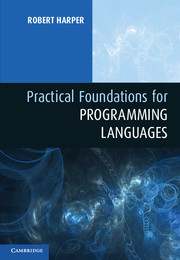Book contents
- Frontmatter
- Contents
- Preface
- Part I Judgments and Rules
- Part II Statics and Dynamics
- Part III Function Types
- Part IV Finite Data Types
- Part V Infinite Data Types
- Part VI Dynamic Types
- Part VII Variable Types
- Part VIII Subtyping
- Part IX Classes and Methods
- Part X Exceptions and Continuations
- Part XI Types and Propositions
- Part XII Symbols
- Part XIII State
- Part XIV Laziness
- 37 Lazy Evaluation
- 38 Polarization
- Part XV Parallelism
- Part XVI Concurrency
- Part XVII Modularity
- Part XVIII Equational Reasoning
- Part XIX Appendix
- Bibliography
- Index
38 - Polarization
from Part XIV - Laziness
Published online by Cambridge University Press: 05 February 2013
- Frontmatter
- Contents
- Preface
- Part I Judgments and Rules
- Part II Statics and Dynamics
- Part III Function Types
- Part IV Finite Data Types
- Part V Infinite Data Types
- Part VI Dynamic Types
- Part VII Variable Types
- Part VIII Subtyping
- Part IX Classes and Methods
- Part X Exceptions and Continuations
- Part XI Types and Propositions
- Part XII Symbols
- Part XIII State
- Part XIV Laziness
- 37 Lazy Evaluation
- 38 Polarization
- Part XV Parallelism
- Part XVI Concurrency
- Part XVII Modularity
- Part XVIII Equational Reasoning
- Part XIX Appendix
- Bibliography
- Index
Summary
Up to this point we have frequently encountered arbitrary choices in the dynamics of various language constructs. For example, when specifying the dynamics of pairs, we must choose, rather arbitrarily, between the lazy dynamics, in which all pairs are values regardless of the value status of their components, and the eager dynamics, in which a pair is a value only if its components are both values. We could even consider a half-eager (or, equivalently, half-lazy) dynamics, in which a pair is a value only if, say, the first component is a value, but without regard to the second.
Similar questions arise with sums (all injections are values, or only injections of values are values), recursive types (all folds are values, or only folds of values are values), and function types (functions should be called by-name or by-value). Whole languages are built around adherence to one policy or another. For example, Haskell decrees that products, sums, and recursive types are to be lazy and functions are to be called by name, whereas ML decrees the exact opposite policy. Not only are these choices arbitrary, but it is also unclear why they should be linked. For example, we could very sensibly decree that products, sums, and recursive types are lazy, yet impose a call-by-value discipline on functions. Or we could have eager products, sums, and recursive types, yet insist on call-by-name. It is not at all clear which of these points in the space of choices is right; each has its adherents, and each has its detractors.
- Type
- Chapter
- Information
- Practical Foundations for Programming Languages , pp. 316 - 322Publisher: Cambridge University PressPrint publication year: 2012

